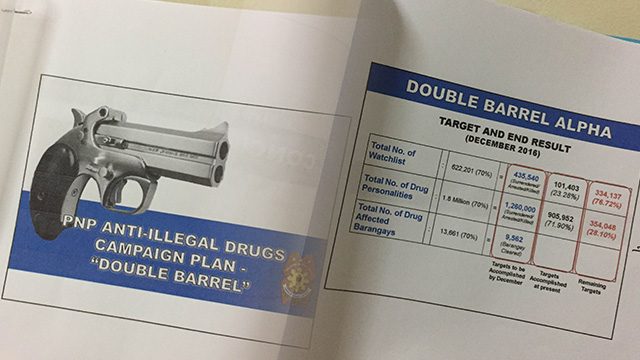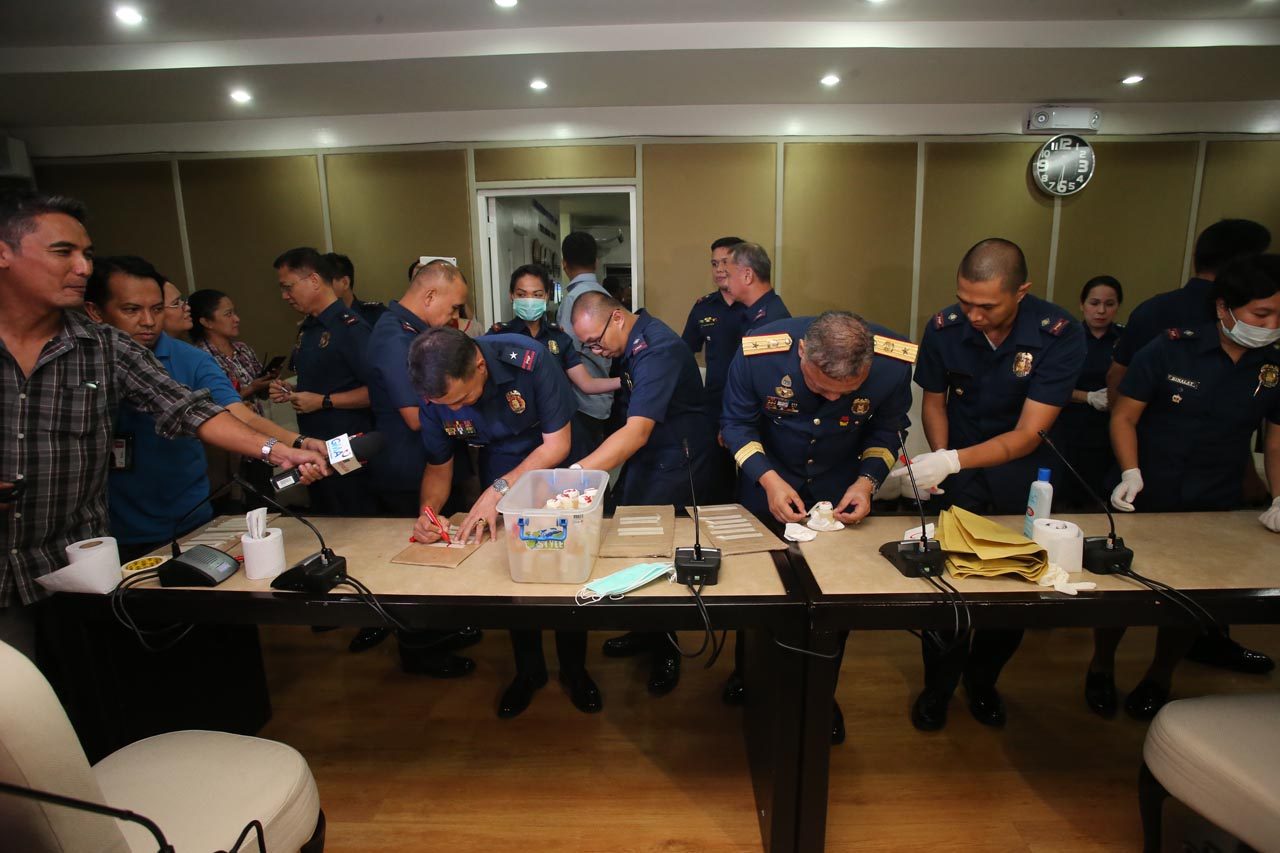SUMMARY
This is AI generated summarization, which may have errors. For context, always refer to the full article.

MANILA, Philippines – They may have been given a 6-month extension by President Rodrigo Duterte but the 160,000 men and women of the Philippine National Police (PNP) will have a tough 2 months ahead as they enter the “alpha” phase of their anti-illegal drugs campaign.
According to a briefing on “Project Double Barrel Alpha” obtained by Rappler, police will need to round up more than 300,000 supposed drug personalities – including those who are part of various police “watchlists” – before the year ends.
The PNP listed as its “target and end result” by December 2016 over 334,137 individuals from drug watchlists.
It has a separate target of 354,048 from the estimated 1.8 million “drug personalities” in the country.
These 2 categories of targets, however, may overlap since some persons not on the watchlists could end up being “drug personalities” based on the 2nd category.
In late October, the PNP implemented “phase 2” of its nationwide anti-narcotics campaign, or “Project Double Barrel Alpha.” The campaign is supposed to focus both on “high value targets” and the clearing of “all drug-affected barangays nationwide.”
Where the numbers came from
Since July 1, Duterte’s first full day in office, law enforcement agencies led by the PNP have waged a “relentless” campaign against illegal drugs.
In the last 4 months, police conducted more than 32,700 anti-illegal drugs operations.
These led to the arrest of over 14,085 suspected drug users and 17,259 drug pushers, according to PNP data.
Some 1,711 drug suspects were killed by the police, the same data said. Another 3,001 deaths have been classified as “under investigation” by the police.

The PNP has been criticized for these operations, due to allegations of extrajudicial killings in the name of the war on drugs.
While the PNP refuses to directly link all these deaths to the illegal drugs campaign, officials in the past have admitted that most of the cases are vigilante-style killings with apparent links to illegal drugs.
Wrong data
Criticism is also rooted in the apparent hasty – and sometimes, outright mistaken – use of data and figures in the “war on drugs.”
Duterte, for instance, had repeatedly stated that more than 3 million Filipinos are either addicted to or have tried illegal drugs.
But the Dangerous Drugs Board (DDB) puts the number at a much lower 1.8 million, according to its own 2015 nationwide survey.
Duterte has also claimed that 2 police are killed daily in the campaign against illegal drugs.
Yet, official data from the police put the number of at least 7 cops killed during the entire period from July 1 to October 26, 2016.
PNP uses DDB data
The baseline data of Project Double Barrel Alpha’s targets is much clearer.
Based on the presentation, which was discussed during the PNP’s last command conference on Tuesday, October 25, police are sticking to the 1.8 million figure provided by the DDB. They want 70% of that figure or 1.26 million people nabbed by December 2016.
As of October 24, 2016, the PNP breaks down the number of drug personalities already accounted for as follows:
| Surrendered | 750,995 (from Oplan TokHang) |
| Arrested | 31,344 |
| Killed | 1,711 |
| DUIs (deaths under investigation) in watchlist, according to Directorate for Intelligence data | 29 |
| PNP ‘Internal Cleansing’ | 1,003 |
| Rehab (from Directorate for Police Community Relations data from 2013-2016) | 10,504 |
| Suspects killed and arrested from 2013 to 1st semester of 2016 | 110,336 |
Based on the PNP’s October 26, 2016 data, a total of 905,952 people or nearly half of the 1.8 million drug personalities in the DDB survey, have already been “accounted” for.
That leaves the 354,048 figure they’re targeting by year-end.
The number is a mix of drug suspects killed, arrested or considered “surrendered” by the police. The “surrenderers” are among those nabbed through “Oplan TokHang,” a literal knock and plead operation which sees officers visit the homes of suspected drug users and pushers to convince them to “surrender.”
Regions to be evaluated
It goes without saying that the first 4 months of the campaign have been tough on the PNP, even without the wave of criticism it has had to handle.

PNP chief Director General Ronald dela Rosa made it a point to decentralize the campaign, giving the country’s 18 police regional directors the free hand to implement the anti-illegal drugs campaign in a matter they deem fit.
Regional chiefs were also given the go-signal to sack provincial, city, and municipal commanders if they underperform.
And this has caused not a few problems in the conduct of the anti-illegal drugs campaign.
Director for Operations Chief Superintendent Camilo Cascolan told Rappler that regional chiefs are still being evaluated and will be put on “probation” should they fail.
They will then have until January 2017 to make up for their past performance. – Rappler.com
Add a comment
How does this make you feel?
There are no comments yet. Add your comment to start the conversation.